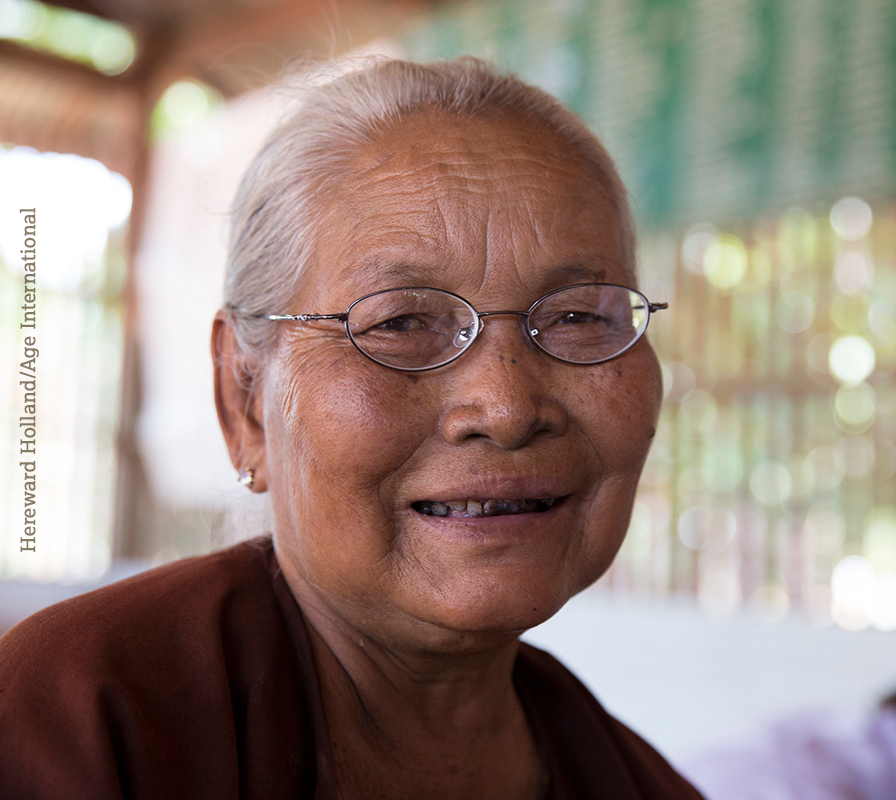As member states and NGOs are gathering at the UN in New York for the 63rd session of the Commission on the Status of Women (CSW), HelpAge International and its partners are calling for universal social protection for vulnerable older women.
Around the world, women are more likely than men to live in poverty throughout their lives, to be disempowered socially and economically, and have their rights denied. Most of the world’s older women struggle to survive and feed their families on very low incomes. They also greatly contribute to communities and economies through their work and care, which is often unrecognised and unpaid.
Increasingly, governments are moving towards universal non-contributory social pensions, and there is growing evidence that these are an effective and affordable solution, especially in countries with high levels of poverty and informal employment. They enhance women’s economic autonomy, strengthen their voice and agency, and can be an effective way of recognising the value of unpaid work.
In Asia Pacific, the rising number of older women has accentuated the importance of strengthening the systems of social pension in the region. In many countries in Asia, social pensions have made a particularly notable contribution to expanding coverage of pensions to women, for example, as in Thailand, women are more likely than men to receive a social pension (women 17 per cent, men 12.2 per cent)[i].
“Women are more likely to work in the informal sector than men and be responsible for caregiving and domestic work, which reduces their ability to save money for their later years and to access formal pensions. This challenge can be addressed through introduction of a universal social pension. Evidence from Asia and the Pacific region shows that social pensions are affordable for low- and middle-income countries, and they bring many positive changes to the lives of older people and their families, particularly older women,” said Usa Khiewrord, Regional Programme Adviser on Social Protection at HelpAge International, Asia Pacific Regional office.
In 2020, the global population aged over 60 will reach one billion, and is projected to double again by 2050. By then, nearly two-thirds of the world’s older people – close to 1.3 billion – will be living in Asia Pacific. Growth is most rapid in low- and middle-income countries, with far-reaching implications that governments need to address.
Justin Derbyshire, Chief Executive of HelpAge International, said: “Evidence from many countries shows how the introduction of universal social protection systems can not only improve older women’s wellbeing and dignity, but also prevent and reduce poverty, inequality and social exclusion in society.
This year could mark a major milestone on the journey towards universal social protection for women of all ages, and a sustainable future for all. At CSW this week, we are calling on Member States to make progress on this commitment.”
[i] Tsao Foundation: Financial security of older women: Perspectives from Southeast Asia (Singapore, 2018)
-Ends-
Contact: Panitee Nuykram, panitee@helpageasia.org, +66 (0) 53 225 440
About HelpAge International
HelpAge International is a global network of organisations promoting the right of all older people to lead dignified, healthy and secure lives. Our mission is to promote the wellbeing and inclusion of older women and men, and to reduce poverty and discrimination in later life.
Learn more about financial security for older women
Webinar “Financial Security of Older Women: Perspectives from Southeast Asia”
Date: Thursday 14 March 2019
Time: 1pm -2.30pm (Malaysia/Singapore)
12noon – 1.30pm (Thailand)
Ageing in Asia has a distinctly female face, with women comprising over half of the older population. Available data shows that women live longer than men, but they are less financially secure. Older women have less income, less savings and less access to pension benefits. Women rely on children as their main source of financial support in old age and as family sizes decline, women’s future financial security are at risk.
Speakers:
- Supriti Bezbaruah, Research Fellow, International Longevity Centre Singapore, Tsao Foundation
- Shagun Gupta, Senior Programme Coordinator, HelpAge International, Myanmar Country Office
- Jariah Masud, Senior Research Fellow, Malaysian Research Institute on Ageing (MyAgeing), Universiti Putra Malaysia
The webinar will be facilitated by Bert Maerten, Head of Programme, HelpAge International, Asia Pacific Regional Office.

